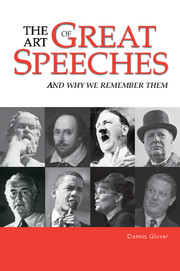Book contents
- Frontmatter
- Contents
- Speeches
- Photographs
- Acknowledgements
- Introduction
- Chapter 1 To save a republic
- Chapter 2 Speech – the essence of democracy
- Chapter 3 Forum
- Chapter 4 Style
- Chapter 5 Emotion
- Chapter 6 Character
- Chapter 7 Evidence
- Chapter 8 Morality
- Chapter 9 Gettysburg
- Chapter 10 Speechwriter
- Conclusion: The ideal orator
- Appendix Common figures and terms
- Notes
- Index
Appendix - Common figures and terms
Published online by Cambridge University Press: 05 October 2012
- Frontmatter
- Contents
- Speeches
- Photographs
- Acknowledgements
- Introduction
- Chapter 1 To save a republic
- Chapter 2 Speech – the essence of democracy
- Chapter 3 Forum
- Chapter 4 Style
- Chapter 5 Emotion
- Chapter 6 Character
- Chapter 7 Evidence
- Chapter 8 Morality
- Chapter 9 Gettysburg
- Chapter 10 Speechwriter
- Conclusion: The ideal orator
- Appendix Common figures and terms
- Notes
- Index
Summary
Figurative speech
There are thousands of techniques for speaking figuratively, and many have multiple names and many subtle variations. The following is a brief but I hope useful list of some of the most commonly observed figurative devices.
Schemes: calculated differences in the way words are arranged to make them more attractive or give them greater force
accumulation: a vigorous summation of previous points
alliteration: beginning a series of words with the same letter or a similar sound
anadiplosis: beginning a clause or sentence with the last or most prominent word of the preceding sentence
anaphora: beginning successive clauses, sentences or paragraphs with the same word or words
antimetabole (also ‘chiasmus’): repetition of words in successive clauses but in (rough) reverse order
antithesis: the employment of opposite or contrasting ideas
aposiopesis: breaking off from a speech suddenly for dramatic effect
apostrophe: sudden redirection of the speech to another person or object
assonance: the use of two or more words that sound similar
asyndeton: the exclusion of conjunctions between words or clauses (usually the omission of ‘and’ in lists)
climax: words or ideas arranged in escalating importance
epanalepsis: beginning or ending a clause or sentence with the same word or words
epiphora: repetition of the same word or words at the end of a clause or sentence
isocolon: a succession of phrases containing an equal number of syllables
parallelism: the use of two or more similarly constructed clauses
parenthesis: interrupting a sentence to introduce additional descriptive information
periphrasis: using multiple words when one or two will do
polysyndeton: the multiple use of conjunctions in rapid succession
repetition: repeating words or clauses for forceful effect
symploce: the combination of anaphora and epiphora in the same line.
tricolon: speaking in threes to emphasise points.
- Type
- Chapter
- Information
- The Art of Great SpeechesAnd Why We Remember Them, pp. 243 - 247Publisher: Cambridge University PressPrint publication year: 2010
- 1
- Cited by



